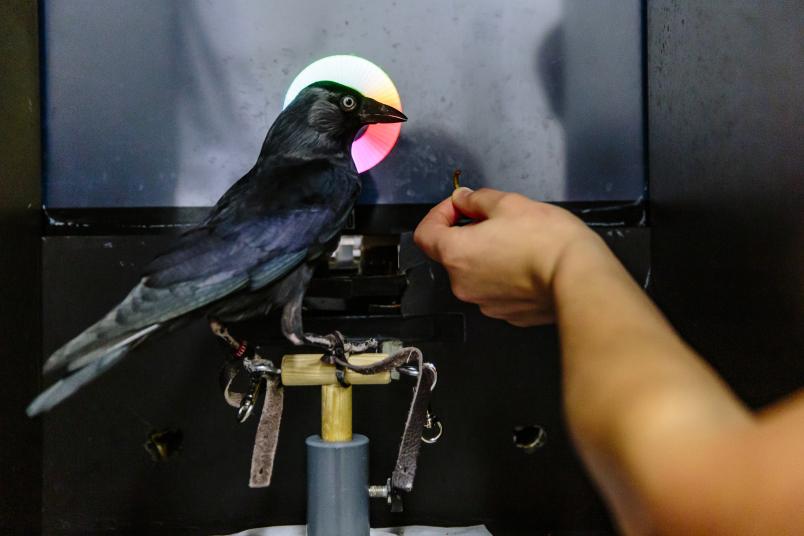
Neuroscience
Comparable memory strategies in birds and humans
Jackdaws improve their memory performance by classifying continuous stimuli into categories. The so-called attractor dynamics provide new insights into the functioning of the brain.
Working memory is a crucial element of higher cognition in both primates – which include humans – and corvids. In their studies with the help of two jackdaws, researchers at Ruhr University Bochum have now discovered remarkable parallels in the memory optimization of primates and corvids. They suggest that the ability to divide continuous stimuli into categories plays a key role in optimizing working memory. The results were published on November 6, 2023 in the journal “Communications Biology”.
Memory performance decreases when working memory is put under greater demand
In order to analyze the memory performance of jackdaws, the researchers led by first author Aylin Apostel and Prof. Dr. Jonas Rose carried out various tests. Two birds were trained to remember colors as accurately as possible. Depending on how accurate they were in their response, they were given different amounts of food. The authors used various manipulations to modify the demands on working memory. For example, the jackdaws had to remember colors over different periods of time or remember several colors at the same time. The reward for correct color reproduction was graded to motivate the birds to respond as accurately as possible.
The researchers found that the birds’ performance decreased when their working memory was put under greater demand. Aylin Apostel: “The functioning of working memory can be seen, for example, in the challenges faced by service staff who have to remember large orders. Similar to humans, corvids also show reduced accuracy and a tendency towards biased representations when working memory demands are higher. This manifests itself in less precise and biased memories, comparable to a waiter bringing two lattes instead of one latte macchiato and one cappuccino. Due to higher demands on the working memory, the waiter only remembers the more general category ‘latte’ instead of both specific orders.” Similarly, the birds showed increasingly categorical response behavior due to higher demands on the working memory.
Attractor dynamics as a fundamental biological principle
The researchers describe attractor dynamics as the central point of the study. Jonas Rose explains: “Attractor dynamics act as a fundamental principle in the brains of corvids and primates, which ultimately direct memories into specific categories. This biases memory representations in parts, making them less precise but overall improve memory performance. The impressive discovery is that this principle works equally effectively in the brains of corvids and primates, although their evolutionary paths differ significantly. It thus appears to be a fundamental biological principle for the efficient use of working memory.”
The comparison of primates and jackdaws provides insights into the evolution and adaptability of working memory. Apostel: “The discovery of common principles in different brains offers promising approaches for the further development of generally valid models that explain the cognitive functioning of animals and humans.”